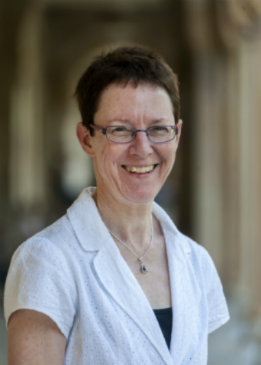Merrilyn is Professor of Education in the School of Education at the University of Queensland and has worked in mathematics education for 25 years as a teacher, researcher and teacher educator.

1. What’s your earliest memory of doing mathematics?
When I was around seven or eight, my family went on a long driving holiday for about three weeks over Christmas, up the Queensland coast to Cairns. In those days we didn’t wear seatbelts and as I hung over my father’s shoulder I remember noticing the speedometer on the dashboard. I was intrigued by the possibilities of being able to estimate distances based on our speed. This idea of how maths can be used in a real-life context to stimulate wonder has permeated my whole career since then.
2. How has mathematics education changed in the time you have been involved in it?
I’ve been a maths educator for about 25 years, and the honest answer is not a lot. We’re still grappling with the same kinds of problems. It’s true that we have a better understanding of how people learn mathematics – but the challenge is using that knowledge to actually help classroom practice. All too often research is completed and then that process simply stops; but we just can’t afford as researchers to stop there. It’s this space between research and practice that I’m trying to expand into, which means dialogue with universities and professional development organisations.
One thing that has changed is the status of the teaching profession, which seems to have declined over time. When I was young, plenty of classmates had proud aspirations of teaching as a career, but I don’t think that is the picture any more.
3. Tell me about a time in your career when something totally flabbergasted you.
Not flabbergasted perhaps, but a surprise for me came with the strength of emotional response I felt – and continue to feel – with the part of my job where I actually teach. Now that I’m no longer in the classroom full-time, I really miss that emotional connection to other humans, along with the gentle thrum of the sense of the unexpected, those surprises that invariably come along no matter how well-planned your lesson. The beauty of being a teacher educator is that I recognise that as grist to my mill; those unexpected events, far from being a hindrance, are a golden opportunity for teachers to go into ‘helicopter mode’ and look at their classroom metacognitively. I am also sometimes quite surprised by the subject knowledge of pre-service teachers I come into contact with, who may be maths graduates but still have issues with lower-level content like properties of polygons, for example. In this case the teachers realised they had gaps in their subject knowledge, so I had to tread carefully; I wanted to address the issue without destroying their confidence. So, in this case I made use of the textbooks all around the room and asked them to use the textbooks to help find the answers to their questions, making an exemplar lesson out of it. I have learnt never to take for granted what students bring to learning to teach.
4. Do you practice mathematics differently in company?
I don’t know. I’ve never really collaborated like that – my maths experience has almost always been solitary, in stark opposition to my work in maths education. It’s handy to have people around to bounce ideas off them but really, most of the maths I do happens in my head. For example, I love cricket, and I remember watching Craig McDermott bowl an amazing slow ball on TV, and the technology was available to measure its speed – I started to think about what maths could come out of it, like what was the real difference between what we perceived as a slow and fast ball, whether we could model the batsman’s response... and suddenly I had sheets of paper covered in calculations. I stopped to cook dinner, but carried on afterwards, and that problem occupied me for nearly a year. I ended up using a graphing program and then a graphics calculator, and using it as part of a presentation I would make at conference, exploring what it means to think mathematically. That was pretty risky, looking back – I was modelling how to do maths, sometimes live in front of an audience! I also wrote a paper about it.
5. Do you think a brilliant maths teacher is born or made?
If I said they were born, that would do me out of a job as a teacher educator! My students used to ask me that question, and I would tell them that everyone brings different gifts to the classroom, but the most important starting point is to commit to the belief that all students can learn maths. Brilliant maths teachers can certainly be made – but that doesn’t mean all the maths teachers I’ve helped make are equal!
6. What’s the most fun a mathematician can have?
Solving problems, of course!
Different mathematicians would give you different answers to that question, of course – and the question is: who would define themselves as a mathematician? For me, finding mathematics in the real world, using it to uncover the essence of something, that’s special.
7. Do you have a favourite maths joke?
I have a collection of cartoons I used in lectures… one of my favourites is a Close to Home titled 'Deep down inside Coach Knott had always wanted to be a math teacher' which shows a coach in front of a line of pupils dressed for gym saying "Count off by the square root of 7!" (I can’t help revelling in my nerdiness)